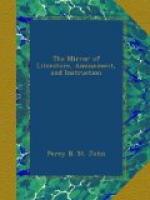Halcyon-days denote a time of peace and tranquillity. The expression takes its rise from a sea-fowl, called among naturalists halcyon, or alcyon, which is said to build its nest about the winter solstice, when the weather is usually observed to be still and calm. Aristotle and Pliny tell us that this bird is most common in the seas of Sicily, that it sat only a few days, and those in the depth of winter, and during that period the mariner might sail in full security; for which reason they were styled Halcyon-days.
P.T.W.
* * * * *
USE OF TIME.
Dr. Cotton Mather, who was a man of uncommon dispatch and activity in the management of his numerous affairs, and improved every minute of his time, that he might not suffer by silly, impertinent, and tedious visiters, wrote over his study-door, in large letters, “Be short.”
Ursinus, a professor in the University of Heidelburgh, and a diligent scholar, to prevent gossips and idlers from interrupting him in his hours of study, wrote over the door of his library the following lines—“Friend, whoever thou art that comest hither, dispatch thy business or begone.”
The learned Scaliger placed the following sentence over the doors of his study—“Tempus meum est ager meus,” “My time is my field or estate.” And it is frequently the only valuable field which the labourer, in body or mind, possesses.
Ever hold time too precious to be spent
With babblers.—Shakspeare.
“Friends,” says Lord Bacon, “are robbers of our time.”
H.B.A.
* * * * *
EPITAPH ON A POTTER.
How frail is man—how short
life’s longest day!
Here lies the worthy Potter, turned to
clay!
Whose forming hand, and whose reforming
care,
Has left us lull of flaws. Vile earthenware!
H.S.G.
* * * * *
LENGTHENING OF THE DAYS.
Selden, in his Table Talk, says “The lengthening of days is not suddenly perceived till they are grown a pretty deal longer, because the sun, though it be in a circle, yet it seems for awhile to go in a straight line. For take a segment of a great circle especially, and you shall doubt whether it be straight or no. But when the sun has got past that line, then you presently perceive the days are lengthened. Thus it runs in the winter and summer solstice, which is indeed the true reason of them.”
* * * * *
Printed and Published by J. LIMBIRD, 143, Strand, (near Somerset House,) London; sold by ERNEST FLEISCHER, 626, New Market, Leipsic; and by all Newsmen and Booksellers.
* * * * *




